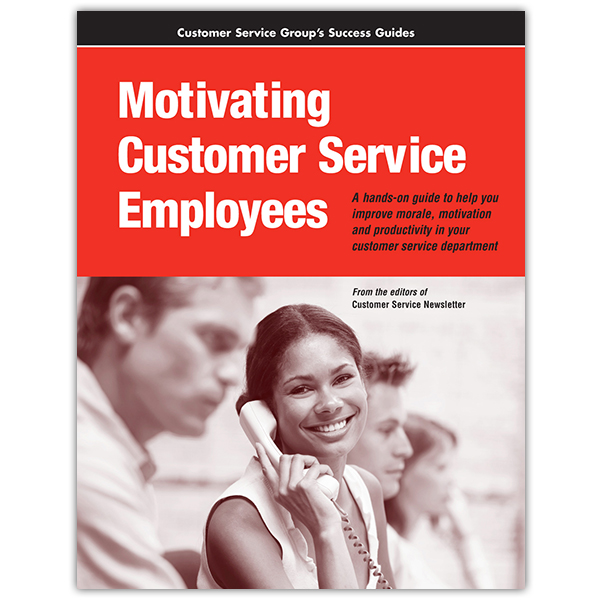Description
If you want to improve service quality and productivity in your department, the single most effective thing you can do is improve employee morale and motivation.
Fortunately there are many ways to do this — from the familiar recognition and reward programs to motivating with good management, teams, training, and more. And the really good news is that most of these programs don’t cost a lot of money.
Motivating Customer Service Employees provides details on the full range of approaches you can use to improve frontline motivation.
Each chapter provides background and guidance along with a unique Proven Strategies section. Here, you’ll learn exactly how these motivational approaches have been put into action in a wide range of companies.
You’ll learn how other managers:
- Hire the right people — after all, you can never motivate the wrong people.
- Create powerful recognition and incentive programs that fully engage and motivate reps.
- Make the frontline job more interesting, challenging, and rewarding through empowerment, teams, good management, training, and more.
Whether you’re looking for fun and inspirational programs you can put into action today, or longer-range programs, you’ll find them all in this realistic and practical guide.
About the Publisher
The Customer Service Group provides ready-to-use tools for customer service training and frontline motivation including a monthly newsletter, training packages, DVDs, and Customer Service Week celebration materials.
Sample
Why motivate?
Why motivate customer service professionals? Because your customers’ satisfaction depends on it.
A strong team of enthusiastic service professionals who are motivated to satisfy your customers can give your organization a competitive edge. Research shows that a company’s relations with its employees mirrors its customer relations. Simply put, the better you treat your customer service reps, the better they’ll treat your customers — and therefore, the more satisfied your customers will be.
These findings reinforce the common-sense observation that customer service people who enjoy their jobs will not only perform those jobs better but will also create a striking positive image of the company in every customer contact.
On the other hand, discontented, stressed-out reps are demotivated and error-prone, and are likely antagonizing and alienating your hard-won customers. Plus they send a strong negative message to customers, who believe that the way they are treated by front-line employees is a reflection of management’s attitude toward customers.
It sounds simple: Motivated reps mean better service and more satisfied customers. Yet finding, training, and motivating customer service employees is a major issue for today’s customer service managers, who need front-line professionals able to keep pace with the increasingly complex and stressful job of representing your organization to your customers.
As manager, you are in the best position to motivate
As manager, it’s your duty to motivate your staff. And you’re in the perfect position to do it. One of the biggest obstacles to motivation is stress — and working in customer service is stressful . . . so much so that the CSR job has commonly been ranked as one of the most stressful occupations. Part of the stress comes from the fact that much of the job can be negative. Customer service reps can become worn down from constantly hearing complaints and working with unhappy, dissatisfied customers. Part of the stress comes from the reps’ lack of control. As manager, you have a large influence over these sources of stress.
But there’s another source of stress more difficult for managers to resolve: the fact that customer service is frequently underappreciated by others in the company, including top management — whose support of customer service in some companies is limited to lip service rather than the commitment of resources to adequately hire, train, and support top-notch customer service professionals.
To truly motivate your reps, you must act as an advocate for the customer service frontline, working with other managers to improve interdepartmental cooperation, removing barriers to good service and sources of frustration such as inadequate systems. Besides working for increased compensation and benefits, you must go to bat for those things that really motivate professional customer service reps: respect, recognition, achievement, authority, empowerment, involvement and quality of work life.
Managers who are really serious about motivating customer service professionals understand that it requires more than pizza parties and cookie days. But the effort you spend on motivating your reps will have a very definite payback in terms of increased productivity and loyalty, and reduction in absenteeism, turnover, and stress-related illnesses.
So how do you actually go about motivating customer service professionals? Fortunately there are many ways to motivate reps — from the more familiar recognition and reward programs to motivating with good management, teams, training, and more. And the really good news is that most of these programs don’t cost a lot of money. This book will outline all of these strategies and more, so turn the page now and find out how to start motivating your reps.
Guarantee
Motivating Customer Service Employees is guaranteed. We want you to use this valuable resource and put its ideas to work in your department. Then, if you are not 100% satisfied, you may return it within 30 days for a full refund.

